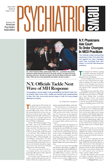Nearly half of American adults being treated for HIV suffer from symptoms of a psychiatric disorder, according to a study in the August 15 issue of Archives of General Psychiatry. That estimate for the prevalence of psychiatric disorders ranges from four to eight times higher than comparable estimates for the general population.
The lead author of the report, Eric G. Bing, M.D., Ph.D., M.P.H., of the Charles R. Drew University of Medicine and Science in Los Angeles, noted that the presence of multiple HIV-related symptoms is a strong predictor of psychiatric disorder.
“HIV symptoms are likely to have a negative impact on a person’s functioning and well-being and thereby increase his or her psychological distress and anxiety,” he said.
The study team enrolled a nationally representative probability sample of 2,864 adults receiving care for HIV in the United States in 1996. The survey, which is called the HIV Cost and Services Utilization Survey (HCSUS), is the largest scientific effort to collect information on such patients to date.
Using a structured psychiatric instrument, the subjects were screened for major depression, dysthymia, generalized anxiety disorders, panic attacks, and drug use during the previous 12 months. Factors independently associated with screening positive for a psychiatric disorder included number of HIV-related symptoms, illicit drug use, drug dependence, heavy alcohol use, and unemployment or disability.
Bing and his colleagues also found that nearly 40 percent of those screened acknowledged using an illicit drug other than marijuana, and more than 12 percent screened positive for drug dependence during the previous 12 months. Factors independently associated with screening positive for drug dependence included having many HIV-related symptoms, being younger, being heterosexual, using alcohol frequently, and screening positive for a mental disorder other than substance abuse.
Prior studies of the prevalence of psychiatric and substance abuse disorders among people being treated for HIV generally relied on convenience samples, which were often limited to specific subpopulations, such as gay men. Some findings of the Bing study differ from those of earlier studies of the general population and HIV-positive patients. Contrary to previous reports of higher rates of psychiatric disorders in gay men, the researchers found that sexual orientation was unrelated to having a psychiatric disorder and that women had only slightly higher rates of depression and anxiety disorders than men.
A complementary study reported in the same issue of the Archives of General Psychiatry also relied on data from HCSUS. The lead author, M. Audrey Burnam, Ph.D., and her colleagues found that 61.4 percent of the 231,400 adults in the survey used mental health or substance abuse services. Of those treated for psychiatric disorders, 26 percent made individual mental health specialty visits, and 29.6 percent took psychotherapeutic medications. Of those treated for substance abuse, 12.4 percent participated in substance abuse self-help groups, 5.6 percent received outpatient substance abuse treatment, and 3.4 percent received residential substance abuse treatment.
Socioeconomic factors commonly associated with poorer access to health services predicted lower likelihood of using mental health outpatient care, but greater likelihood of receiving substance abuse treatment services. Persons living in the Northeast were more likely to receive services.
In commenting on the studies to Psychiatric News, Sanja M. Sharma, M.D., an assistant professor in the department of psychiatry and behavioral sciences at Emory University and staff member of the Infectious Disease Program of the Grady Health System, said, “Given the significant likelihood of an existing mental health and/or substance dependence disorder within this population, it is important to routinely screen for those illnesses and treat them, just as a health care provider would do in the case of tuberculosis. . . .These illnesses can have a major impact on treatment adherence, compliance, and ultimately the cost of services used by people who are infected with HIV/AIDS.”
Sharma also noted the importance of providing training to health care professionals, such as nurse practitioners, nurses, and physician assistants who work with people infected with HIV/AIDS that would enable those professionals to do basic screening for psychiatric and substance abuse problems.
An abstract of the study, “Psychiatric Disorders and Drug Use Among Human Immunodeficiency Virus-Infected Adults in the United States” is posted on the Web at archpsyc.ama-assn.org/issues/v58n8/abs/yoa9450.html. An abstract of the study “Use of Mental Health and Substance Abuse Treatment Services Among Adults With HIV in the United States” is posted at archpsyc.ama-assn.org/issues/v58n8/abs/yoa9339.html. ▪
